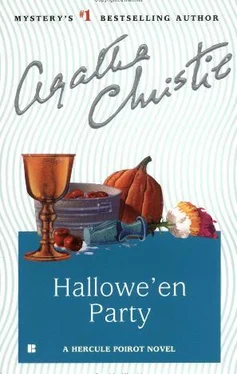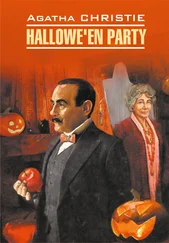Agatha Christie - Hallowe'en Party
Здесь есть возможность читать онлайн «Agatha Christie - Hallowe'en Party» весь текст электронной книги совершенно бесплатно (целиком полную версию без сокращений). В некоторых случаях можно слушать аудио, скачать через торрент в формате fb2 и присутствует краткое содержание. Год выпуска: 2004, ISBN: 2004, Издательство: Berkley, Жанр: Классический детектив, на английском языке. Описание произведения, (предисловие) а так же отзывы посетителей доступны на портале библиотеки ЛибКат.
- Название:Hallowe'en Party
- Автор:
- Издательство:Berkley
- Жанр:
- Год:2004
- ISBN:ISBN-13: 978-0425129630
- Рейтинг книги:3 / 5. Голосов: 1
-
Избранное:Добавить в избранное
- Отзывы:
-
Ваша оценка:
- 60
- 1
- 2
- 3
- 4
- 5
Hallowe'en Party: краткое содержание, описание и аннотация
Предлагаем к чтению аннотацию, описание, краткое содержание или предисловие (зависит от того, что написал сам автор книги «Hallowe'en Party»). Если вы не нашли необходимую информацию о книге — напишите в комментариях, мы постараемся отыскать её.
Hallowe'en Party — читать онлайн бесплатно полную книгу (весь текст) целиком
Ниже представлен текст книги, разбитый по страницам. Система сохранения места последней прочитанной страницы, позволяет с удобством читать онлайн бесплатно книгу «Hallowe'en Party», без необходимости каждый раз заново искать на чём Вы остановились. Поставьте закладку, и сможете в любой момент перейти на страницу, на которой закончили чтение.
Интервал:
Закладка:
"What shall I get you?" said Spence. "No fancy stuff here, I'm afraid. No black currant or rose hip syrup or any of your patent things. Beer? Or shall I get Elspeth to make you a cup of tea? Or I can do you a shandy or Coca-Cola or some cocoa if you like it. My sister, Elspeth, is a cocoa drinker."
"You are very kind. For me, I think a shandy. The ginger beer and the beer?
That is right, is it not?"
"Absolutely so."
He went into the house and returned shortly afterwards carrying two large glass mugs.
"I'm joining you," he said.
He drew a chair up to the table and sat down, placing the two glasses in front of himself and Poirot.
"What was it you said just now?" he said, raising his glass.
"We won't say "Here's to crime." I've done with crime, and if you mean the crime I think you do, in fact which I think you have to do, because I don't recall any other crime just lately, I don't like the particular form of murder we've just had."
"No, I do not think you would do so."
"We are talking about the child who had her head shoved into a bucket?"
"Yes," said Poirot, "that is what I am talking about."
"I don't know why you come to me," said Spence. "I'm nothing to do with the police nowadays. All that's over many years ago."
"Once a policeman," said Hercule Poirot, "always a policeman. That is to say, there is always the point of view of the policeman behind the point of view of the ordinary man. I know, I who talk to you. I, too, started in the police force in my country."
"Yes, so you did. I remember now your telling me. Well, I suppose one's outlook is a bit slanted, but it's a long time since I've had any active connection."
"But you hear the gossip," said Poirot. "You have friends of your own trade. You will hear what they think or suspect or what they know."
Spence sighed.
"One knows too much," he said, "that is one of the troubles nowadays.
There is a crime, a crime of which the pattern is familiar, and you know, that is to say the active police officers know, pretty well who's probably done that crime. They don't tell the newspapers but they make their inquiries, and they know. But whether they're going to get any further than that well, things have their difficulties."
"You mean the wives and the girl friends and the rest of it?"
"Partly that, yes. In the end, perhaps, one gets one's man. Sometimes a year or two passes. I'd say, you know, roughly, Poirot, that more girls nowadays marry wrong 'uns than they ever used to in my time."
Hercule Poirot considered, pulling his moustaches.
"Yes," he said, "I can see that that might be so. I suspect that girls have always been partial to the bad lots, as you say, but in the past there were safeguards."
"That's right. People were looking after them. Their mothers looked after them.
Their aunts and their older sisters looked after them. Their younger sisters and brothers knew what was going on. Their fathers were not averse to kicking the wrong young men out of the house. Sometimes, of course, the girls used to run away with one of the bad lots. Nowadays there's no need even to do that. Mother doesn't know who the girl's out with, father's not told who the girl is out with, brothers know who the girl is out with but they think "more fool her'. If the parents refuse consent, the couple go before a magistrate and manage to get permission to marry, and then when the young man who everyone knows is a bad lot proceeds to prove to everybody, including his wife, that he is a bad lot, the fat's in the fire!
But love's love; the girl doesn't want to think that her Henry has these revolting habits, these criminal tendencies, and all the rest of it. She'll lie for him, swear black's white for him and everything else.
Yes, it's difficult. Difficult for us, I mean.
Well, there's no good going on saying things were better in the old days. Perhaps we only thought so. Anyway, Poirot, how did you get yourself mixed up in all this?
This isn't your part of the country, is it?
Always thought you lived in London. You used to when I knew you."
"I still live in London. I involved myself here at the request of a friend, Mrs. Oliver. You remember Mrs. Oliver?"
Spence raised his head, closed his eyes and apeared to reflect.
"Mrs. Oliver? Can't say that I do."
"She writes books. Detective stories.
You met her, if you will throw your mind back, during the time that you persuaded me to investigate the murder of Mrs. McGinty. You will not have forgotten Mrs. McGinty?"
"Good lord, no. But it was a long time ago. You did me a good turn there, Poirot, a very good turn. I went to you for help and you didn't let me down."
"I was honoured flattered that you should come to consult me," said Poirot.
"I must say that I despaired once or twice.
The man we had to save to save his neck in those days I believe, it is long ago enough for that was a man who was excessively difficult to do anything for.
The kind of standard example of how not to do anything useful for himself."
"Married that girl, didn't he? The wet one. Not the bright one with the peroxide hair. Wonder how they got on together.
Have you ever heard about it?"
"No," said Poirot. "I presume all goes well with them."
"Can't see what she saw in him."
"It is difficult," said Poirot, "but it is one of the great consolations in nature that a man, however unattractive, will find that he is attractive-even what appears to be madly attractive-to some woman. One can only say or hope that they married and lived happily ever afterwards."
"Shouldn't think they lived happily ever afterwards if they had to have Mother to live with them."
"No, indeed," said Poirot. "Or Stepfather," he added.
"Well," said Spence, "here we are talking of old days again. All that's over.
I always thought that man, can't remember his name now, ought to have run an undertaking parlour. Had just the face and manner for it.
Perhaps he did.
The girl had some money, didn't she? Yes, he'd have made a very good undertaker. I can see him, all in black, calling for orders for the funeral. Perhaps he can even have been enthusiastic over the right kind of elm or teak or whatever they use for coffins. But he'd never have made good selling insurance or real estate. Anyway, don't let's harp back." Then he said suddenly, "Mrs. Oliver. Ariadne Oliver.
Apples. Is that how she's got herself mixed up in this? That poor child got her head shoved under water in a bucket of floating apples, didn't she, at a party? Is that what interested Mrs. Oliver?"
"I don't think she was particularly attracted because of the apples," said Poirot, "but she was at the party."
"Do you say she lived here?"
"No, she does not live here. She was staying with a friend, a Mrs. Butler."
"Butler? Yes, I know her. Lives down not far from the church. Widow.
Husband was an airline pilot. Has a daughter.
Rather nice-looking girl. Pretty manners.
Mrs. Butler's rather an attractive woman, don't you think so?"
"I have as yet barely met her, but, yes, I thought she was very attractive."
"And how does this concern you, Poirot? You weren't here when it happened?"
"No. Mrs. Oliver came to me in London. She was upset, very upset.
She wanted me to do something."
A faint smile showed on Superintendent Spence's face.
"I see. Same old story. I came up to you, too, because I wanted you to do something."
"And I have carried things one step further," said Poirot. "I have come to you."
"Because you want me to do something?
I tell you, there's nothing I can do."
"Oh yes there is. You can tell me all about the people. The people who live here. The people who went to that party.
The fathers and mothers of the children who were at the party. The school, the teachers, the lawyers, the doctors. Somebody, during a party, induced a child to kneel down, and perhaps, laughing, saying:
Читать дальшеИнтервал:
Закладка:
Похожие книги на «Hallowe'en Party»
Представляем Вашему вниманию похожие книги на «Hallowe'en Party» списком для выбора. Мы отобрали схожую по названию и смыслу литературу в надежде предоставить читателям больше вариантов отыскать новые, интересные, ещё непрочитанные произведения.
Обсуждение, отзывы о книге «Hallowe'en Party» и просто собственные мнения читателей. Оставьте ваши комментарии, напишите, что Вы думаете о произведении, его смысле или главных героях. Укажите что конкретно понравилось, а что нет, и почему Вы так считаете.












